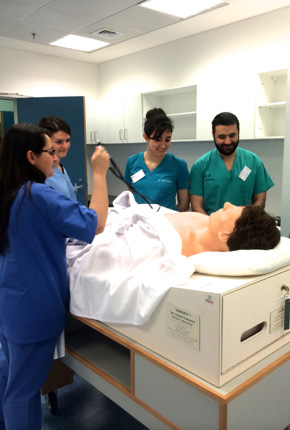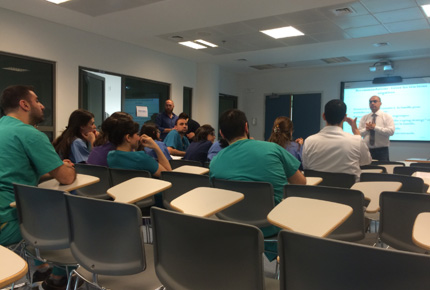Breaking bad… news
LAU’s Clinical Simulation Center gathers anesthesiology residents from around the country for a one-of-a-kind training experience.

Dr. Abi Raad organized two role-playing scenarios in rooms with high fidelity mannequins whose full-body health monitors can be controlled and manipulated from behind an invisible glass.

The workshop also incorporated theoretical aspects of breaking bad news, with presentations by anesthesiologist Dr. Hanane Barakat and clinical psychologist Dr. Boutros Ghanen.
Last Saturday morning, anesthesiology residents from universities across Lebanon gathered at the LAU Byblos Clinical Simulation Center (CSC) for a workshop on “Breaking Bad News” to the family members of critical patients.
The center’s director, Associate Professor of Anesthesiology Vanda Abi Raad, organized two role-playing scenarios in rooms with high fidelity mannequins whose full-body health monitors can be controlled and manipulated from behind an invisible glass. Professional actors performed as the family members of patients with intra-operative complications, while the workshop participants were asked to play the part of the doctors tasked with breaking bad news to patients’ families. Strategically scheduled between these activities were lectures and debriefing sessions led by anesthesiologist Dr. Hanane Barakat and clinical psychologist Dr. Boutros Ghanen.
Barakat’s lecture was rich with solid advice gained from her years of experience. “You need to take the time to meet the family before the patient’s operation so that they feel they know you,” she stressed, adding that in grave cases, “You must take five minutes to compose yourself and prepare, step by step, what you will say.”
“It’s most important to remain calm to the maximum and to try avoiding scientific terminology,” stressed participant Joelle Saroufin from the University of Balamand. As a third year resident, the difficult of task of breaking bad news is not new to her. “The family of the patient does not know what has happened,” she explained. “We need to reassure them that we are going to do our best; that we are not going to leave the patient. We have to be honest.”
Saroufin was impressed by the authenticity of actress Greta Aoun’s performance as the wife of a patient who had gone into anaphylactic shock as a reaction to anesthesia. Aoun’s distressed reactions required Saroufin to draw from her own experience and put Barakat’s suggestions into practice.
Ghanem’s psychological insights were also welcomed by the workshop’s participants. Hend Youssef, a student from the Lebanese University, believes that the anesthesiologist needs to be both a doctor and a psychologist in order to maintain a good relationship with the patient and family. As such, Youssef was eager to hear Ghanem’s recommendations, which provided detailed counsel on how to break bad news with empathy and respect.
“This is the first time a workshop on this matter takes place for anesthesiology residents nationally and internationally because the subject is delicate and very often underestimated in the curriculum of anesthesiology,” said Abi Raad.
More
Latest Stories
- Beneath the Smile: Dr. Omar Itani Reveals the Hidden Cost of Emotional Labor in Sales
- SOE Launches its Distinguished Scholar Visiting Program with International Guest Dr. Feras Batarseh
- LAU Nursing Camp Opens Eyes, Hearts and Futures
- Meet Dr. Zeina Khouri-Stevens, Executive Vice President for Health Services
- LAU Family Medicine Graduates to Benefit from a Partnership With Nova Scotia
- AKSOB Assistant Professor Shares Her Vision for the Future of Learning
- LAU Simulation Models Celebrate 20 Years of Learning, Leadership and Service
- The School of Engineering Hosts the Lebanese Electromagnetics Day

